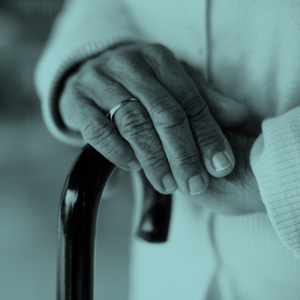
Alzheimer's - The Looming Challenge of Dementia
October’s Care Conversation heard from the Chief Executive of the Alzheimer’s Society, Jeremy Hughes, on the challenge of dementia
- NULL - NULL
- NULL
There were now 800,000 people living with dementia in the UK, Alzheimer’s Society Chief Executive Jeremy Hughes told delegates, and the number was likely to be 1m by the end of the decade.
Alzheimer’s was the most common form of dementia, affecting around two thirds of dementia sufferers, he said. One in three over-65s would die with dementia, while one in four hospital beds was occupied by someone with the disease. “They may well be there for something else, such as a fracture, but dementia means they stay longer.” Very often their dementia was not even recognised, he added, which could mean patients going unfed. “They come out of hospital malnourished and in a worse condition than when they went in. That’s not really what hospitals are for.”
Around 80% of people in care homes had dementia, and more than 40% of dementia sufferers identified themselves as isolated and lonely, although difficulties in surveying people with dementia meant that the true figure was likely to be far higher, he warned.
Despite these stark statistics, however, just one twelfth of the money spent on cancer research went on dementia research, he told delegates, while the cost of dementia to the economy was around £23bn per year. “By and large that’s money being badly spent to produce poor outcomes, such as those extended hospital stays,” he said.
There were, however, successful moves to improve the situation. The National Dementia Strategy had launched in 2009 – following intensive work from his organisation – to try to get dementia on the map, and the coalition government had also committed itself to it. “That’s partly because dementia is something you can do something about in a fairly short time frame, as it’s been such a neglected issue – you can make enormous strides forward in quite a short period.”
The Prime Minister had set up three ‘champion groups’, he continued, the first of which was ‘health and care’, with a focus on driving up diagnosis rates.
“Tackling diagnosis is key, because only 43 per cent of people with dementia get diagnosed,” he stressed, and there was now a ‘quantifiable ambition’ to get the figure up to two thirds by 2015. Early diagnosis was also vital, he said, and the Alzheimer’s Society wanted to see more “integration of that diagnosis back into the GP practice – why can’t we have specialists working in GP practices, and train up more GPs to do more of this work themselves? We need to break down the primary/secondary care divide.”
Tackling hospital care was also vital – with very simple questions that could be asked of patients – along with social care support. The latter was “probably where we’ve made the least progress”, he said. “We need to make sure there are better ways to support both people in the community and in care homes and make sure they have access to the services they need.”
The second champion group was around ‘dementia-friendly communities’ – something where there would always be scope for improvement – while the third was around research. “This has been the Cindarella – it’s very hard to break through,” he said, with far fewer opportunities for researchers than in other areas. While vastly more resources were needed for research into the causes of dementia, a good deal could be done in the meantime around researching what constituted good care and support, he pointed out.
Another significant development was the Dementia Action Challenge, he told the seminar – an alliance of key players with 140 national and 700 local members. “What’s really significant is not just that everyone’s signed up, it’s that you have to come up with a genuine plan of action – it’s not just about box-ticking. And once you get these people together, there’s also lots of opportunities for joint action.
“This is about societal change – changing the public’s attitude,” he continued. “In the last four years it has changed, and at quite a fast pace. We need to enable people with dementia to participate in society. And we are moving forward.”
Long term change will also come from increased public awareness and understanding which is being driven by a programme to create one million ‘Dementia Friends’.
Get in touch to register your interest in joining the network
View all past events
